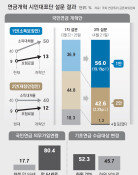Korean venture firms on a rapid growth trajectory
Korean venture firms on a rapid growth trajectory
Posted January. 26, 2021 07:24,
Updated January. 26, 2021 07:24
It was found that the number of employees at Korean venture firms with a value of over 100 billion won stood at 231,500. The number is close to that of Samsung Group, which has 280,000 employees at home and abroad. The number of venture firms with a value of over 100 billion won amounted to 617, up 30 from last year and each firm is employing an average of 382 people. The venture firms have become a leader in creating solid jobs in the Korean economy, where “growth without employment” is accelerating. These “young” companies, which are 17.5 years old on average, are making high profits with a management style even more aggressive than conglomerates. Their R&D spending-to-sales ratio stood at 2.8% and net profit margin amounted to 5.9%, which are all higher than the average of conglomerates and responsible for one-twentieth of Korean exports.
These rapidly growing venture firms are a beacon of hope for the Korean economy, which keeps failing to join the ranks of advanced economies. The problem is a growing number of venture firms complaining about the difficulties of doing business in Korea. Korea’s van-hailing operator Tada, which aspired to become the Korean version of Uber, had to shut down its main services after the ruling party passed a bill banning Tada’s taxi business last year. With the expansion of the 52-hour workweek system to companies with more than 50 but less than 300 employees, Korean game venture firms are lagging behind in competition with Chinese competitors.
A revision to the Commercial Act passed by the National Assembly at the end of last year threatens the management rights of listed venture companies by making them vulnerable to speculative capital. A bill known as the severe disaster law, which aims to put business owners or CEOs behind the bars in the event of death accident at work, has put venture businessmen in jail, too. Corporate venture capital (CVC), which was promoted by the government to attract investment into venture companies, has lost its purpose due to various restrictions imposed to prevent the owners of conglomerates from pocketing personal gains.
The next goal for these venture companies is to become a “unicorn company,” which refers to an unlisted venture company with a value of over 1 trillion won. Of more than 500 unicorn companies around the world, Korea has only 20 of them, far behind 242 of the U.S. and 119 of China, and less than 24 of India. Some of these unicorn companies have become the target of profit-sharing scheme proposed by the ruling party just because they managed to grow amid the pandemic. Lawmakers and policymakers should keep in mind that if venture companies are dragged down by regulations that only exist in Korea and fall into the Peter Pan Syndrome as a result, the future jobs for our youth will also disappear.







